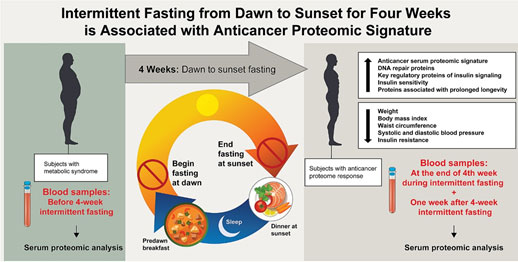Jains observe fasts of different types and of different duration. Human studies have largely been limited to observational studies of religious fasting during Ramadan, which are type of intermittent fasting, whereas Jain fast are water only fast. Hence, the changes occurring with intermittent or alternate day fast cannot be extrapolated to complete fasting.
While religions have long maintained that fasting is good for the soul, but its bodily benefits were not widely recognized until the early 1900s’. The bulk of the scientific evidence for the health benefits of fasting has come from animal studies or fasting in human being in Islamic Ramadan. There are limited number of studies conducted in Buddhist or Christian populations but none on Jain fasting. This study aims to study impact of Jain fasting on health i.e., weight, BMI, pulse, blood pressure, lipid profile, renal functions, blood sugar, hematological parameters, serum proteins, and serum cortisol.
Results:
A total of 110 subjects (M: 27, F: 83) in the age range of 13-86 years (average 50.2 years) participated in the study. While 72 subjects did short fasting (average 3.4 days), 38 did prolong fasting (average 10.1 days). Mean BMI of participants was 27.08 (16.1-45.2).
There was significant decrease in weight, BMI, SBP, serum globulin and serum HDL post fasting. However, significant increase was observed in pulse rate, fasting plasma glucose, blood urea, albumin globulin ratio, serum TG, VLDL, and serum cortisol levels [Table 1]. These changes were similar in both genders (data not shown).
Table 1:
Change in anthropometric, clinical, and biochemical parameters with fasting
| Parameters |
Pre-Fasting |
Post Fasting |
P (Paired ‘t’ Test) |
| BMI (kg/m2) |
27.1±4.9 |
26.2±4.9 |
<0.0001 |
| Pulse Rate (beat/min) |
81±10 |
83±11 |
0.001 |
| Systolic BP (mmHg) |
130±17 |
128±15 |
0.012 |
| Diastolic BP (mmHg) |
81±10 |
81±9 |
0.301 |
| Haemoglobin (gm/dl) |
13.2±1.5 |
13.2±1.5 |
0.907 |
| Fasting Plasma Glucose (mg/dl) |
102.9±35.0 |
132.0±42.0 |
<0.0001 |
| Blood Urea (mg/dl) |
24.9±8.0 |
28.6±14.3 |
0.014 |
| S. Creatinine (mg/dl) |
0.75±0.19 |
0.73±0.19 |
0.339 |
| S. Total Protein (gm/dl) |
7.47±0.54 |
7.37±0.62 |
0.109 |
| S. Albumin (gm/dl) |
4.40±0.35 |
4.37±0.39 |
0.408 |
| S. Globulin (gm/dl) |
3.10±0.42 |
3.01±0.41 |
0.024 |
| Albumin/Globulin Ratio |
1.44±0.19 |
1.48±0.21 |
0.012 |
| S. Triglycerides (mg/dl) |
137.6±68.3 |
149.0±67.1 |
0.031 |
| S. Total Cholesterol (mg/dl) |
203.0±46.9 |
203.9±49.1 |
0.736 |
| S. HDL (mg/dl) |
48.3±12.2 |
45.7±12.6 |
<0.0001 |
| S. LDL (mg/dl) |
132.8±37.8 |
132.8±37.8 |
0.585 |
| S. VLDL (mg/dl) |
22.0±10.5 |
24.2±11.1 |
0.010 |
| S. Cortisol (μg/dl) |
13.5±5.9 |
17.2±6.3 |
<0.0001 |
Prolong fast lead to significantly higher weight loss, decrease in BMI and fall in hemoglobin, serum total protein and serum globulin when compared to short fasting. Serum triglycerides levels and albumin globulin ratio increased significantly with prolong fast when compared to short fast. On the contrary, fasting plasma glucose was significantly increased after short fast than prolong fast. Several parameters e.g., pulse rate, blood urea, serum creatinine, serum albumin, serum total cholesterol and serum LDL showed increase with short fasting, whereas decreased significantly with prolong fasting. There was no significant difference in SBP, DBP, serum HDL, serum VLDL and serum cortisol between short fasting and prolong fasting [Table 2].
Table 2:
Change in anthropometric, clinical, and biochemical parameters according to fasting duration:
| Parameters |
Short Fasting (3-≤7 days, n=72) |
Prolong Fasting (>7-30 days, n=38) |
P |
| BMI |
-0.75±0.35 |
-1.1±0.40 |
<0.0001 |
| Pulse Rate (beat/min) |
3.2±6.3 |
-0.5±4.9 |
0.003 |
| Systolic BP (mmHg) |
-2.4±9.2 |
-1.7±7.9 |
0.674 |
| Diastolic BP (mmHg) |
0.9±5.0 |
-0.3±4.9 |
0.248 |
| Haemoglobin (gm/dl) |
0.24±0.57 |
-0.42±1.20 |
<0.0001 |
| Fasting Plasma Glucose (mg/dl) |
39.7±40.7 |
8.8±30.0 |
<0.0001 |
| Blood Urea (mg/dl) |
8.8±15.5 |
-6.2±8.7 |
<0.0001 |
| S. Creatinine (mg/dl) |
0.02±0.13 |
-0.08±0.15 |
<0.0001 |
| S. Total Protein (gm/dl) |
7.47±0.54 |
7.37±0.62 |
<0.0001 |
| S. Albumin (gm/dl) |
0.09±0.22 |
-0.24±0.39 |
<0.0001 |
| S. Globulin (gm/dl) |
0.03±0.35 |
0.01±0.12 |
<0.0001 |
| Albumin/Globulin Ratio |
0.01±0.12 |
0.07±0.16 |
0.026 |
| S. Triglycerides (mg/dl) |
7.6±45.6 |
18.7±68.9 |
0.003 |
| S. Total Cholesterol (mg/dl) |
10.5±21.4 |
-17.3±29.1 |
<0.0001 |
| S. HDL (mg/dl) |
-2.1±6.2 |
-3.8±10.0 |
0.275 |
| S. LDL (mg/dl) |
9.8±19.6 |
-14.7±28.0 |
<0.0001 |
| S. VLDL (mg/dl) |
2.8±7.5 |
1.2±11.0 |
0.364 |
| S. Cortisol (μg/dl) |
3.5±6.0 |
3.9±6.2 |
0.749 |
Conclusion:
The present study, first of its kind on prolong fasting, has convincingly demonstrated an improvement in BMI, blood pressure, and lipid profile. Serum cortisol levels increased with duration of fast. Fasting is a cost-effective, non-invasive, has minimal risk of adverse effects for practice in most cases, and has the added benefit of improving physical fitness.
Acknowledgement:
https://www.ncbi.nlm.nih.gov/pmc/articles/PMC7333753/
(To see more references and to read full article please visit above link)



